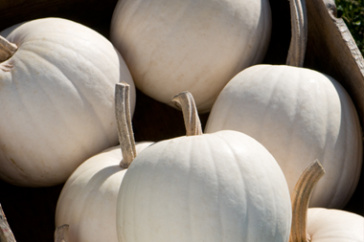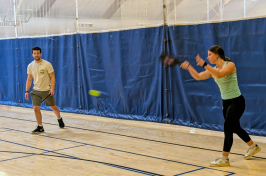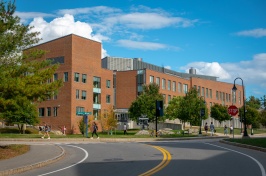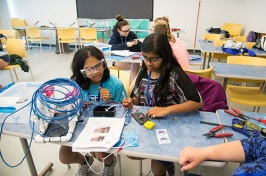The University of New Hampshire is a flagship research university that inspires innovation and transforms lives in our state, nation and world. More than 16,000 students from all 50 states and 71 countries engage with an award-winning faculty in top ranked programs in business, engineering, law, health and human services, liberal arts and the sciences across more than 200 programs of study. UNH’s research portfolio includes partnerships with NASA, NOAA, NSF and NIH, receiving more than $100 million in competitive external funding every year to further explore and define the frontiers of land, sea and space.
UNH Agricultural Research Boosts New England’s Thanksgiving Bounty

Snowball, a small, round pumpkin, was developed in a collaborative effort with Hybrid Seeds of New Zealand and is available from Johnny’s Selected Seeds. Credit: Johnny’s Selected Seeds
DURHAM, N.H. – As New Englanders prepare to sit down to give thanks, their Thanksgiving table may be filled with an abundant supply of delicious, locally and regionally grown foods due to extensive agricultural research conducted by the University of New Hampshire.
No Thanksgiving would be complete without winter squash and pumpkins. For five decades, continuous support from the NH Agricultural Experiment Station has allowed J. Brent Loy, emeritus professor of plant genetics, to undertake the longest continuous cucurbit breeding program in North America. As a result, New Englanders now enjoy some of the tastiest squash and pumpkins on the market. Loy’s work has resulted in more than 70 new varieties of squash, pumpkins, gourds, and melons sold in seed catalogs throughout the world, including several released this year.
Is creamed spinach or spinach salad on your Thanksgiving menu? If so, you’ll be happy to know experiment station-supported research has identified which spinach varieties grown in New Hampshire’s coldest months are the tastiest. Becky Sideman, extension professor of sustainable horticulture production and professor of sustainable agriculture and food systems, recently completed a two-year winter spinach trial to determine the most suitable spinach varieties and planting dates for winter production in New Hampshire in an unheated high-tunnel environment. In both years, the research found a direct relationship between temperature and sugar content, with colder temperatures in the days leading up to harvest heightening the sugar content in the leaves.
For those in the Northeast who are enjoying a southern favorite -- oyster dressing -- experiment station-supported scientists are not only helping local oyster farmers understand the ecological impact of oyster farming on Great Bay, but they are helping make sure the oysters from Great Bay are safe to eat. Researchers recently conducted the first study of oyster farming-nitrogen dynamics in New Hampshire, providing the first solid research on the state’s oyster farming industry and the role oyster farms play with nitrogen removal.
Many lovers of apple pie enjoy a hefty scoop of vanilla ice cream on the side. For consumers of Hood or Stonyfield vanilla ice cream, they will be enjoying products made from some of the finest milk in the region. Hood sources some of its milk from the Fairchild Dairy Teaching and Research Center, and Stonyfield sources some of its organic milk from the Organic Dairy Research Farm. Both farms recently were recognized as producing some of the highest quality milk in the nation from the Dairy Farmers of America.
And someday, kiwiberry wine might become a staple for New Englanders with their turkey because of UNH’s efforts to promote kiwiberries as a new, high-value crop in northern New Hampshire. Plant breeder Iago Hale has established the nation’s first ever kiwiberry breeding research program at the Woodman Horticultural Research Farm. He is characterizing and evaluating the North American collection of cold-hardy kiwis, nearly 200 accessions, to identify promising varieties for the region and parent plants for new variety development.
Founded in 1887, the NH Agricultural Experiment Station at the UNH College of Life Sciences and Agriculture is UNH’s original research center and an elemental component of New Hampshire's land-grant university heritage and mission.
Latest News
-
October 8, 2025
-
October 2, 2025
-
September 24, 2025
-
September 15, 2025
-
August 21, 2025














































